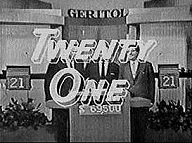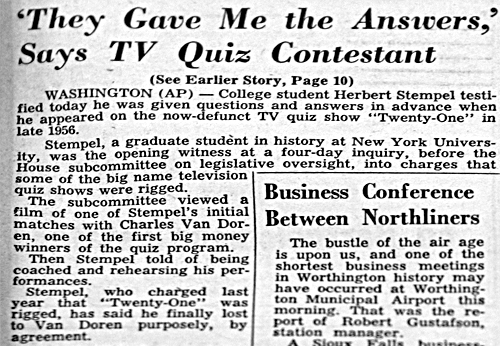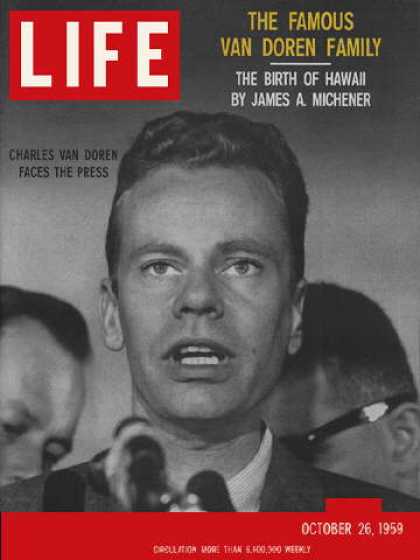
In the early days of television, the quiz shows of the 1950s became tremendously popular as contestants won large cash prizes and the nation watched by the millions on their new television sets. The show producers discovered the shows would be far more entertaining if the contestants knew the answers to the questions beforehand. The most popular program "21" staged a contestant Charles Van Doren who became a champion and a national hero until the fraud was exposed. Where do we draw the line in the name of entertainment?
In the mid 1950s television began to take over our lives. One of the most popular shows was the quiz show, where common people became national stars as they answered difficult questions and won huge cash prizes while millions of people tuned in on their brand new TVs. Quickly the show producers and sponsors found that the quiz shows were much more popular and entertaining when the contestants won these large cash prizes, and the shows devolved into blatant manipulation where the most popular shows pre-selected the winners turned the contestants into actors who knew all of the answers to all of the questions beforehand. The massive fraud was eventually exposed, and American's had to give up their love affair with contestants who'd been promoted as wonderful role models of intellectualism.
The quiz show "The $64,000 Question" debuted in 1955. Overnight the show was a huge success and its contestants became big stars by answering questions of increasing difficulty as the stakes got higher. The American public was fascinated by ordinary people winning large sums of money. Meanwhile the sponsors were only too happy to spend their money because television advertising made their sales go through the roof. The $64,000 Question and the early television quiz shows were not rigged, at least at first. The contestants were tested behind the scenes so that the producers knew what questions would trip up the contestants. When the producers and sponsors wanted someone off the show, they would just ask them a question they knew the contestant would not be able to answer. Eventually, the manipulation became more direct as the shows got more popular. Contestants would soon be given the questions beforehand, and later the outcomes of the quiz shows would be pre-determined.
Twenty-one was the most notable of the quiz shows both for its popularity and for the scandal that ensued. The first pilot was aired in 1956 and was played honestly. The show was a dismal failure. The contestants failed to answer many of the questions, and the show's sponsor threatened to pull out of the show if that happened again. The producers Dan Enright and Jack Barry then decided that the show would be rigged. Not only were contestants given the answers beforehand, but their every move was choreographed for maximum entertainment value. They were instructed to comment about the questions in a certain way and show excitement or disappointment. They turned off the air conditioning in the contestants' booths, then showed close-ups of them sweating and mopping their brow at strategic times, all for dramatic effect.
Twenty-one brought in and promoted their contestants for maximum entertainment value. The first champion was Herb Stempel, a smart but rather nerdy former military man. While he had a very high IQ and could have performed well on his own answering the questions, his reign as champion was completely rigged. Later, they brought in Columbia college professor Charles Van Doren to challenge Stempel. Van Doren was good looking, smooth talking, and a natural entertainer. The weekly show reached its height of popularity as they staged a series of ties between Stempel and Van Doren, with both contestants being paid well but knowing it was all a fraud. America was riveted to the show every week, mostly with people rooting for the all-American hero Van Doren to knock off the nerdy Stempel. Finally, Stempel was ordered to lose. He was ordered to miss an easy question which he clearly knew the answer to . Stempel protested to the producers and offered to face off against Van Doren straight without being given the answers, but to no avail. Though he could have answered the question correctly when his turn came, he dutifully answered it wrong, and Van Doren became the champion.
America celebrated Charles Van Doren as its intellectual hero. He appeared on the cover of Time magazine and was given a spot as a regular on NBC's Today show. Meanwhile, Stempel was cast into obscurity. Stempel then tried to blow the whistle on Twenty-one but with no concrete proof of the show's rigging, his accusations were passed off as jealousy. Richard Goodwin, a Congressional lawyer, eventually traveled to New York to investigate rumors that the show was rigged. He interviewed the show's producers as well as Stempel and Van Doren, but at first failed to find any concrete proof other than Stempel's statements.
Twenty-one and the rest of the quiz shows unraveled almost at once starting with the downfall of the show "Dotto" when concrete proof of the show's rigging was presented to the press. One by one the quiz shows were shown to be fraudulent, but Americans hung on to their hope that Twenty One and Van Doren were honest, despite Stempel's accusations. Eventually Goodwin located one of the other Twenty One contestants who had a sealed registered letter to himself containing all of the answers to the questions the day before the show was aired. This provided the smoking gun. Van Doren was forced to testify under oath to a House committee and he admitted that he'd been given the answers. Though he came clean, Van Doren was dropped immediately by NBC and was forced to resign his professorship at Columbia. America does not want a hero to be someone that deceives us. Afterwards, quiz shows and all other broadcast media were regulated to the point of it was no longer legal to present lies, deception, and fraud on television.
I understand this is about quiz shows and entertainment, but this story really cuts to the heart of morality. People are willing to lie and deceive if there's a lot of money on the table. Good people, like Herb Stempel and Charles Van Doren, are willing to throw away honesty for money and fame. The producers Jack Barry and Dan Enright weren't bad people either in my opinion. They just wanted their show to succeed and saw the rigging as the best way to do it. What about us? Americans were willing to believe Van Doren was honest even in the face of mounting evidence to the contrary. We want an American hero so much we don't let go easily.
I often wonder about when people show remorse after their lies and fraud are exposed. They say it was a mistake and they'd do things differently if they had to do it over again. Look at the Nixon's men in the Watergate scandal. Look at every politician who is caught cheating on his wife or committing some financial fraud. Would they say it was a mistake if they didn't get caught? Perhaps the mistake was getting caught. Can you live with yourself if you lie and deceive and commit fraud but don't get caught? Would Van Doren ever have admitted the fraud had he not been forced to? Or would he have continued to enjoy being America's hero?









BORSE LOUIS VUITTON ITALIA
I appreciate you posting about it first rate data. Your websites are cool. I?ˉm shocked about the details that you will have on the weblogblog site. This can reveals tips on how accordingly you fully understand this sort of object. Added until this online page, will come back additional articles or reviews.
CHEAP RALPH LAUREN
It’s wonderful to read the paper your content regularly, my friend. When i definitely will concentrate on your blog on a regular basis in addition to go to your blogging site you just read your hottest content articles, at the time you revise. Keep up! We do hope you have a great working day.